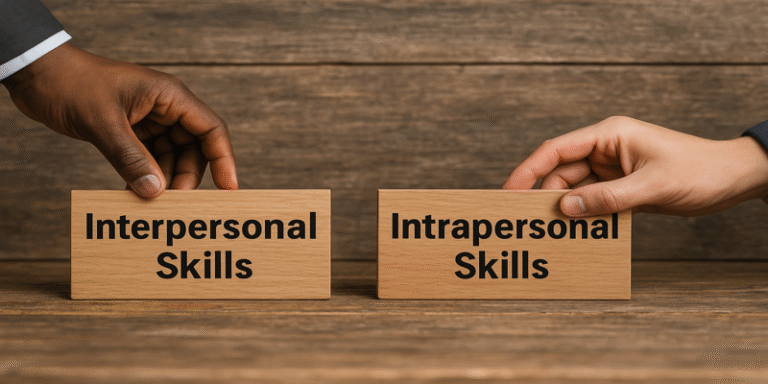In today’s dynamic and interconnected world, both interpersonal skills and intrapersonal skills are essential to achieving success and fulfilment. Though distinct in scope and application, these two sets of abilities are deeply intertwined, forming the foundation for personal growth and professional effectiveness. By understanding their differences and synergies, individuals can enhance how they engage with others while also mastering self-management. This article explores these fundamental categories of skills, highlighting their definitions, applications, and the ways in which they complement one another.
1.0 Interpersonal Skills: Interaction with Others
Definition
Interpersonal skills, often called social or people skills, refer to the abilities that enable individuals to communicate, collaborate, and build relationships effectively in diverse settings. These skills are crucial in fostering teamwork, mutual respect, and productive communication. According to Daniel Goleman (2006), interpersonal skills form the essence of social intelligence—the capacity to navigate complex social environments successfully.
Examples
Key interpersonal skills include communication, teamwork, empathy, active listening, conflict resolution, and networking.
- Communication ensures the clear and effective exchange of ideas, a vital element in leadership and collaboration.
- Empathy enables individuals to understand and respond to others’ emotions (Adler & Elmhorst, 2010).
- Active listening fosters trust and understanding, ensuring conversations are meaningful and constructive.
Together, these skills help individuals engage positively in both professional and personal contexts.
Application
Interpersonal skills are indispensable in almost every area of life, particularly in the workplace. They underpin effective teamwork, leadership, and customer relations. For example, a leader who communicates clearly and resolves conflicts tactfully can guide a team toward shared goals. Similarly, empathy helps in building long-term relationships with colleagues and clients (Smith & Johnson, 2018).
Strong interpersonal competence enhances collaboration, reduces misunderstandings, and promotes a positive organisational culture.
2.0 Intrapersonal Skills: Understanding Yourself
Definition
In contrast, intrapersonal skills concern an individual’s ability to understand, regulate, and reflect upon their inner thoughts and emotions. These skills form the core of self-awareness and personal mastery. As highlighted by Howard Gardner (1983) in his theory of multiple intelligences, intrapersonal intelligence is a key determinant of personal success, as it enables individuals to make informed and authentic decisions.
Examples
Examples include self-reflection, emotional intelligence, self-motivation, resilience, and self-confidence.
- Self-reflection encourages continuous learning by allowing individuals to evaluate their behaviours and choices.
- Emotional intelligence (Salovey & Mayer, 1990) enables recognition and control of one’s emotions, promoting emotional balance.
- Self-motivation drives persistence in achieving goals, while resilience allows recovery from setbacks.
- Self-confidence fosters belief in one’s abilities, empowering individuals to take initiative and embrace challenges.
Application
Intrapersonal skills are crucial for personal development, emotional stability, and effective decision-making. For instance, emotional intelligence helps individuals manage stress and maintain composure in demanding situations, while self-reflection encourages growth through introspection.
In the workplace, such skills underpin goal-setting, time management, and mental resilience—qualities that differentiate successful professionals from those who struggle under pressure (Brown & White, 2020).
Moreover, self-motivation sustains long-term achievement, while self-confidence enhances leadership potential and career advancement.
3.0 The Interplay of Interpersonal and Intrapersonal Skills
Though distinct, interpersonal and intrapersonal skills are mutually reinforcing. Effective interactions with others rely heavily on self-awareness, while strong intrapersonal control enhances social behaviour.
For example, a person with high emotional intelligence—an intrapersonal skill—is more likely to demonstrate empathy and active listening, both key interpersonal abilities. Likewise, understanding one’s emotions allows for more constructive communication and conflict resolution.
In professional contexts, interpersonal skills facilitate teamwork, negotiation, and leadership, while intrapersonal skills provide the emotional regulation and focus necessary to sustain these efforts. Stephen Covey (1989) illustrates this relationship in The 7 Habits of Highly Effective People, emphasising that self-mastery precedes effective interdependence. In other words, those who manage themselves well are best equipped to lead and collaborate successfully.
4.0 Integrating Interpersonal and Intrapersonal Skills
The integration of both skill sets is essential for holistic development. A leader who is self-aware and capable of emotional regulation (intrapersonal skills) will likely excel in communication and empathy (interpersonal skills). Conversely, strong interpersonal interactions often reinforce one’s internal confidence and emotional stability.
Consider a manager overseeing a demanding project. If the manager remains aware of their stress levels and regulates their emotions effectively, they can maintain composure under pressure. At the same time, by using empathy, clarity, and active listening, they can support their team and resolve conflicts constructively. This integration creates a balanced and effective leadership style, combining emotional intelligence with strategic communication (Goleman, 2006).
Such synergy fosters trust, enhances team cohesion, and promotes organisational success. Whether in leadership, education, or customer service, individuals who balance both skill types are better equipped to handle complex interpersonal dynamics while maintaining personal well-being.
5.0 The Value of Continuous Improvement
Both interpersonal and intrapersonal skills are dynamic—they require ongoing development and reflection. In an era defined by rapid technological and social change, adaptability, emotional intelligence, and resilience are increasingly valued. Regular self-assessment, feedback-seeking, and lifelong learning are essential for maintaining and enhancing these competencies.
Many of these abilities are transferable across contexts. For example, interpersonal skills such as teamwork and communication, cultivated through sports or community engagement, are invaluable in professional environments. Similarly, intrapersonal strengths such as self-motivation and resilience, often developed through personal challenges, directly enhance career success and employability (LinkedIn Learning, 2024).
In summary, both interpersonal and intrapersonal skills are indispensable to personal growth and professional achievement. Interpersonal skills enable individuals to connect, communicate, and collaborate with others, while intrapersonal skills empower them to understand, regulate, and motivate themselves. When cultivated together, these abilities lead to stronger relationships, greater self-awareness, and enhanced emotional balance.
The integration of interpersonal and intrapersonal skills forms the cornerstone of effective leadership, personal fulfilment, and career success. Continuous improvement in these areas is a lifelong process—one that rewards individuals with deeper self-understanding, stronger connections, and a more meaningful engagement with the world around them.
References
Adler, R. B., & Elmhorst, J. M. (2010). Communicating at Work: Principles and Practices for Business and the Professions. McGraw-Hill.
Brown, T., & White, J. (2020). Personal Development and Self-Management: Strategies for Success. Professional Growth Press.
Covey, S. R. (1989). The 7 Habits of Highly Effective People. Simon & Schuster.
Gardner, H. (1983). Frames of Mind: The Theory of Multiple Intelligences. Basic Books.
Goleman, D. (2006). Social Intelligence: The New Science of Human Relationships. Bantam Books.
LinkedIn Learning. (2024). Developing Transferable Skills. Retrieved from LinkedIn Learning.
Salovey, P., & Mayer, J. D. (1990). “Emotional Intelligence.” Imagination, Cognition, and Personality, 9(3), 185–211.
Smith, A., & Johnson, B. (2018). Effective Communication and Team Dynamics. Workplace Skills Press.









